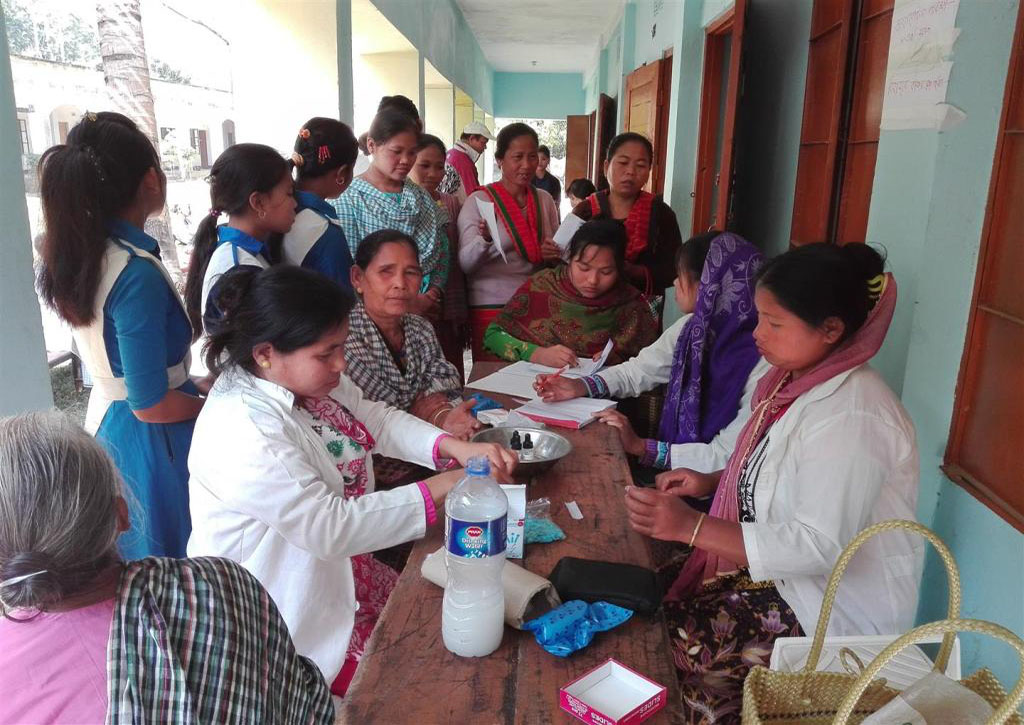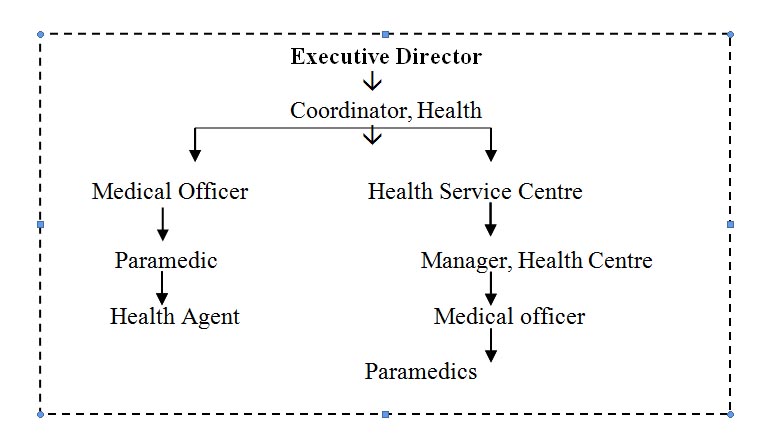Health, Water and Sanitation
In order to provide health services, sanitation and safe water to Hill Tracts people, IDF started this program in 1995 with the assistance of Sida in Chittagong Hill Tracts and gradually expanded to other areas covered by IDF. IDF implements this program through medical officers (MBBS), paramedics, health workers and health agents. Health Workers and Paramedics are paid employees where the Health agents are elected from amongst the group members.
Health agents are provided training on common diseases, primary health care, reproductive and child health, safe water and sanitation, HIV/AIDS and eye care. Health agents provide health related counseling to the members and report any illness or sickness of members or their family members to the branch managers who immediately visit the sick person and take necessary action for treatment. The health workers work under the guidance of Coordinator, Health Program. However their activities are supervised by respective Area Managers or Branch Managers depending on the place of posting.
IDF is piloting a scheme to see how full health support including doctor’s check up, and full medicines costs could be provided to the members and their family members with the existing premium.

Objectives
In order to achieve the above objectives, IDF runs health insurance program and covers the health risks of all family members of IDF. At present, IDF has one paramedic for two branches who provides both preventive and primary health care services members and their family members.
Paramedics Service: Currently 70 well-trained paramedics are working at different in order to ensure quality counseling & treatment facilities to IDF members. Paramedics get all support from Area & Branch Managers. All centres have elected health agents who got training on primary health care. Health agents work in her area under the guidance of paramedics and medical officers.

Progress Of Health Activities:
Health Centers:
IDF operates 3 regular health Centers. Health Center 1 is located at Bohoddarhat, Health Center 2 is located at Halishahar, Naya Bazar and Health Center 3 at Mohora. The last one is named after Kazi Halima Sattar Health complex and is proposed to be developed as a Maternity and Child Hospital. All the 3 Centers are being run by the qualified MBBS doctors with assistances of other technical staff and laboratorial equipment and facilities. Therefore the members and their dependents who visit these Centers receive the services of the MBBS doctors. There are provisions in these Centers of providing some basic medical tests. The patients are also given free medicines. Members receive cash money in case medicines cannot be provided.
The year 2021 was a troubled year, because of the Covid-19 situation. The turn up of the patients was low during the year. A total of 2,755 patients received health services from these 3 Health centers (1,189 patients from Health Center 11,109 patients from Health Center 2 and 457 patients from Health Center 3. Free medicines were provided to all 3,419 patients. Medicines worth BDT 5,23,305 were given to all these 3,419 patients..
Health education sessions were organized to make the members aware about primary health care and become health conscious so that they can take preventive measures against some common diseases. The numbers of such sessions organized in the year were 14,154 and the number of participants attended the sessions were 1,59,999.
Operations of Clinics:
IDF’s basic health services throughout the project areas are provided by organizing Satellite Clinics. Within the operational areas of IDF Branch offices, these satellite clinics are organized at different villages where Paramedics provide regular health services to the members. In addition to the Paramedics, there are village Health Agents who assisting running the satellite clinics. The Health Assistants are selected from the villages are trained to perform their responsibilities. There are two major responsibilities of the Health Agents: to inform patients of the date and place of holding the clinics and to make physical check-up of the patients. Since the Agents are local people, the patients can also consult them whenever necessary.
During the year 2021, the numbers of satellite clinics organized were 15,141 and the numbers of patients attending the satellite clinics were 1,26,103.
Telemedicine Services:
IDF started telemedicine services on an experimental basis in early 2019 in 3 project areas of Sualok, Lama and Satkania. This was started especially for the patients who were found, for some reasons, unable to visit any clinics or camps. But soon it was found more necessary for most of the patients due to sudden prevalence of Covid-19. The services were found not only necessary but also effective. IDF doctors and all Medical Assistants are providing now the telemedicine services throughout the project area. During the year 2021, a total number of 10,706 patients had received telemedicine services.
Gyane and Medical Camps:
These types of gynae and medical camps are being organized by IDF regularly. This year, due to Covid situation, however no Camps could be organized.
Eye Care: Under the Health program, IDF developed facilities for eye care that are scarce in rural areas though eye problem is very common and vital. IDF initiated this program by organizing eye camps in project village areas in collaboration with Lions Club of Chattogram southern Bandarban in 2002. Eye care was undertaken as project in 2004 with the assistance of Hellen Keller International (HKI) and CEITC (Chattogram Eye Infirmary Training Center). Under this arrangement, CEITC provided training to IDF health workers on eye care and treatment including surgery to poor patients. IDF is continuing this activity as a regular program with CEITC after the completion of project in 2006.
The basic objectives of eye care supports are to i) raise awareness on eye care and blindness among the common people, ii) provide primary care, treatment and referral support, iii) arrange surgery services at free of cost or nominal cost. During the year 2021, of course, no Eye Camp could be organized due to COVID situation.
Electronic health record software:
IDF had started and implemented a digital health service by Electronic Health Record software “DOTPLUS” since 11 October 2021 by Outreach for All, Inc, USA. It was started phase wise through piloting and participated by 4 doctors and 6 paramedics initially.Currently all the doctors and paramedics are using this Health Record software for their daily activities.
Eye Care
Under the Health program, IDF developed facilities for eye care that are scarce in rural areas though eye problem is very common and vital. IDF initiated this program through eye camps in collaboration with Lions Club of Chattogram southern Bandarban in 2002. Eye care was undertaken as project in 2004 with the assistance of Hellen Keller International (HKI) and CEITC (Chattogram Eye Infirmary Training Center). Under this arrangement, CEITC provided training to IDF health workers on eye care and treatment including surgery to poor patients. IDF is continuing this activity as a regular program with CEITC after the completion of project in 2006.
The basic objectives of eye care supports are to i) raise awareness on eye care and blindness among the common people, ii) provide primary care, treatment and referral support, iii) arrange surgery services at free of cost or nominal cost.
Objectives
- Raise awareness on eye care and blindness among the common people;
- Provide primary care, treatment and referral support;
- Arrange surgery services at nominal cost to the poor;

